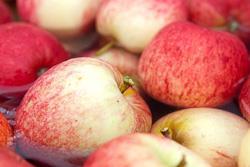
With the return to a large volume for this year’s New Zealand apple crop meaning a corresponding drop in size profiles, exporters’ eyes are understandably turning towards Asian consumers.
The smaller sized fruit is a good fit for a range of markets across Asia, but with a caution born of experience New Zealand’s traders are aiming to keep careful control over supply volumes to avoid overwhelming demand.
“A smaller fruit size than normal will result in increased attention from exporters into the Asian, Middle Eastern and English markets,” explained Brendon Osborn, general manager of grower-exporter Heartland Fruit. “We have to be careful that we don’t flood these markets, and that we work with receivers to provide a steady flow of quality fruit that they can sell.”
The difficult season in Europe last year has created additional interest in Asian markets, according to Tracey Burns, grower-exporter Freshmax NZ’s export manager for Asia.
“Whilst the smaller size profile suits a lot of our customers throughout the greater Asia region, we are mindful that we do not want the market to come under pressure quickly,” she said. “Our long-standing customers…will be working hard to ensure regular sales are not undermined by any opportunists.”
Apples also face competition from local fruits, and Ms Burns said New Zealand apples need to provide reliable taste and value to ensure regular shelf space.
The rising cost of Chinese Fujis, meanwhile, is opening up some more space in the market, and the country’s exporters are effectively using various new and exclusive varieties to increase interest in New Zealand apples.
Early harvesting of the New Zealand crop began in the first half of this month, and as of week seven warm weather had curtailed further apple growth and pushed along fruit maturity, with early fruit showing good colour levels.
“Our dry matter testing to date has shown that the fruit should have excellent eating and storing quality,” added Mr Osborn. “Hopefully this will be the impression our customers have when they receive our fruit.”



